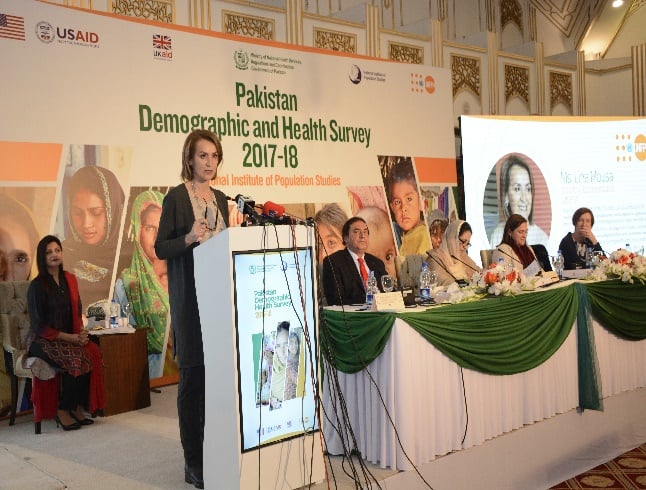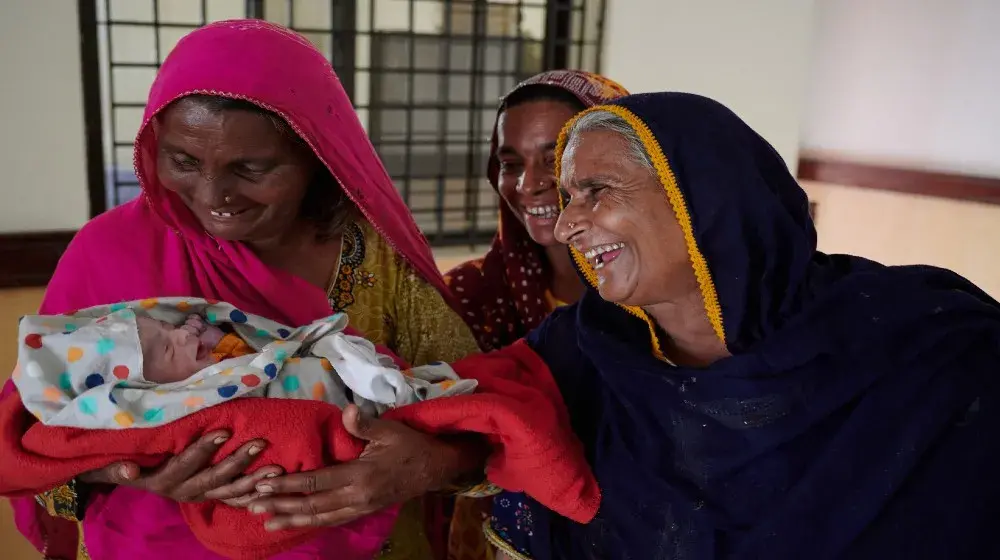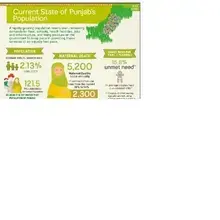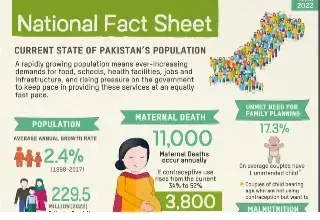Pakistan DHS- Data Dissemination Event
February 25, 2019

Pakistan has released the results of the Demographic and Health Survey (PDHS) 2017-18 on February 25, 2019. The PDHS was successfully conducted by the National Institute of Population Studies (NIPS) with the support of United States Agency for International Development (USAID), the United Nations Population Fund (UNFPA), and the Department for International Development (DFID).
The PDHS provides data on fertility levels and preferences, contraceptive use, maternal and child health, infant mortality levels, immunization, nutritional status of mothers and children, disability, migration, women’s empowerment, domestic violence, awareness and behavior regarding HIV/AIDS, and other health-related issues. These indicators are important to the health and family planning programmes for evidence-based planning and to offer guidelines to programme managers and policymakers, so that they can effectively plan and implement future interventions. The results also provide updates on data already collected through censuses and other sources.
The release of the PDHS results could not have come at a more opportune moment for the country taking into consideration the importance of the most up-to-date population-related data for evidence-based policy formulation and informing the Voluntary National Report on the progress towards the SDGs, lessons learned and challenges. It will also enable Pakistan to take stock of what has been achieved over the last 20 years in the implementation of ICPD Programme of Action (PoA) and to chart the way forward.
UNFPA Representative to Pakistan, Ms. Lina Mousa, stated that ensuring greater availability and use of disaggregated data is central to stepping up our joint efforts, with a sense of urgency, to better support Pakistan to achieve sustainable development, building on the country’s commitments to ICPD PoA, the SDGs and FP2020. She further noted that strengthening data for sustainable development will ensure that no one is left behind and that the furthest behind is reached first. Ms. Lina Mousa took note of UNFPA transformative results, namely ending preventable maternal death, ending unmet need for family planning, and ending gender-based violence and harmful practices, as essential accelerators for the achievement of the SDGs.
PDHS Findings
According to the report, Pakistan has one of the highest fertility rates in the region with an average of 3.6 births per woman. The use of family planning among married women has stagnated around 34% over the last five years.
The unmet need for contraception remains high at 17%. Nearly 9 in 10 women of reproductive age receive antenatal care from a skilled provider such as a doctor, nurse, midwife, or lady health visitor. Half of women make four or more antenatal care visits, a notable increase from 37% in 2012-13. More births are delivered in a health facility, from 48% in 2012-13 to 66% in 2017-18. Yet, 1 in 3 births are delivered at home. According to PDHS, more than 1 in 4 ever-married women (28%) have experienced physical violence since age 15, and 6% have experienced sexual violence. Seven percent of women who have ever been pregnant have experienced violence during pregnancy. Three in ten women who have ever experienced physical or sexual violence sought help to stop the violence, yet 56% never sought help nor told anyone.
Pledge Wall
A Pledge wall containing the three transformative results of the UNFPA Strategic Plan 2018-2021 was displayed on one of the corners of the Conference Hall. At the end of the inauguration session, participants were invited to sign the pledge wall reflecting their commitment to join hands in extending their support to the Government of Pakistan in achieving the aforementioned three transformative results i.e. ending preventable maternal death, ending unmet need for family planning, and ending gender-based violence and harmful practices. The main objective of the pledge wall was to demonstrate that individual commitment, contributions, passion and efforts matters irrespective of where they work and what their role is in their organizations, and that they can play their part in making a difference in the lives of women and girls in Pakistan.




